The Minister of Foreign Affairs of the Russian Federation, Sergei Lavrov, answers the questions of journalists and readers of ” Komsomolskaia Pravda.”
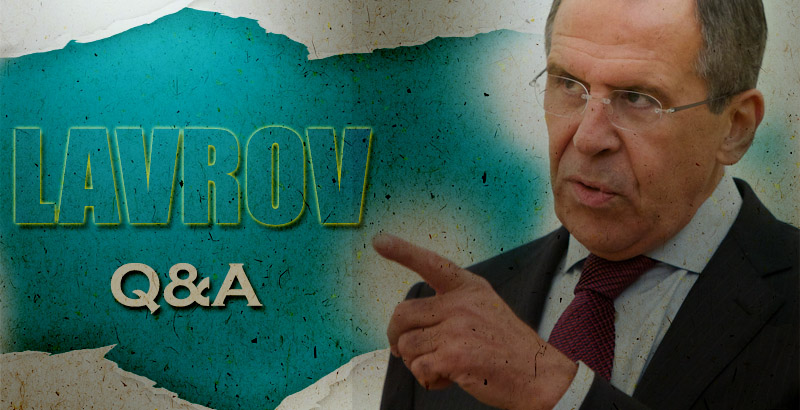
Originally appeared at KP; Appeared in Bulgarian at Memoriabg; Translated by Valentina Tzoneva exclusively for SouthFront
Komsomolskaia Pravda: Sergei Viktorovich, good day.
Sergey Lavrov: Hello.
Komsomolskaia Pravda: “Let’s take the bull by the horns straight away. We recieved hundreds of frankly disturbing calls. The situation around our country is extremely difficult. They tried to crush us with sanctions. NATO is already touching our borders, the are creating a system for anti-missile defence. In the foreign media, there is an unprecedented demonization of our country.
They do not want to hear us. At the head of this process is the United States. President Obama said that the American nation is exceptional and that other countries must play by the rules written by the USA. To us, evidently, the role of vassals does not suit us. Are we eternaly doomed to rivalry and confrontation by the consolidated West, led by the USA, which can turn into a confrontation at any moment and let’s not talk about more dramatic scenario?”
Alexander Shmelev writes directly: “The people are increasingly talking that there is going to be war. How serious are these concerns?”
Lavrov: There will not be any world war. This was stated by President Putin in the movie of Vladimir Soloviov. And I am convinced that the responsible politicians will not allow this to happen, even from the side of the West. Because everyone still remembers the horrors of the First and Second World Wars. Russia suffered the greatest losses during the war in Europe. China, by the way, suffered the greatest losses during the war in the Pacific Ocean against the Japanese militarism. And the politicians, I repeat, can not allow this to happen. Of course, we can rely on others, but above all, we have to think about our readiness to prevent the fueling of a new war.
These attempts are made in relation to increasing of military potential over its reasonable suficiency and they are also in violation of international agreements. You mentioned the anti-missile defence. In 2001, the USA withdrew from the Anti-Ballistic Missile Treaty. And at that time, George W. Bush told Vladimir Putin in response to his concerns: “Don’t worry, this is not against you. I understand that you will have to take some retaliating measures. Do whatever you see fit.”
We have to remember this when some of our nervous neigbours from Eastern Europe comment on our quiet alerts, that in case the military infrastructure of NATO gets close to our borders, we will take retaliatory steps. They forget about this and blame Russia for everything.
By the way, we are blamed for the Ukrainian crisis – just like that. And about Syria, they say that we are obliged, we are responsible too. Now they want us to help in Libya. Soon, maybe they will blame us for the events taking place in Yemen. This is a conscious strategy. I have no doubts about it.
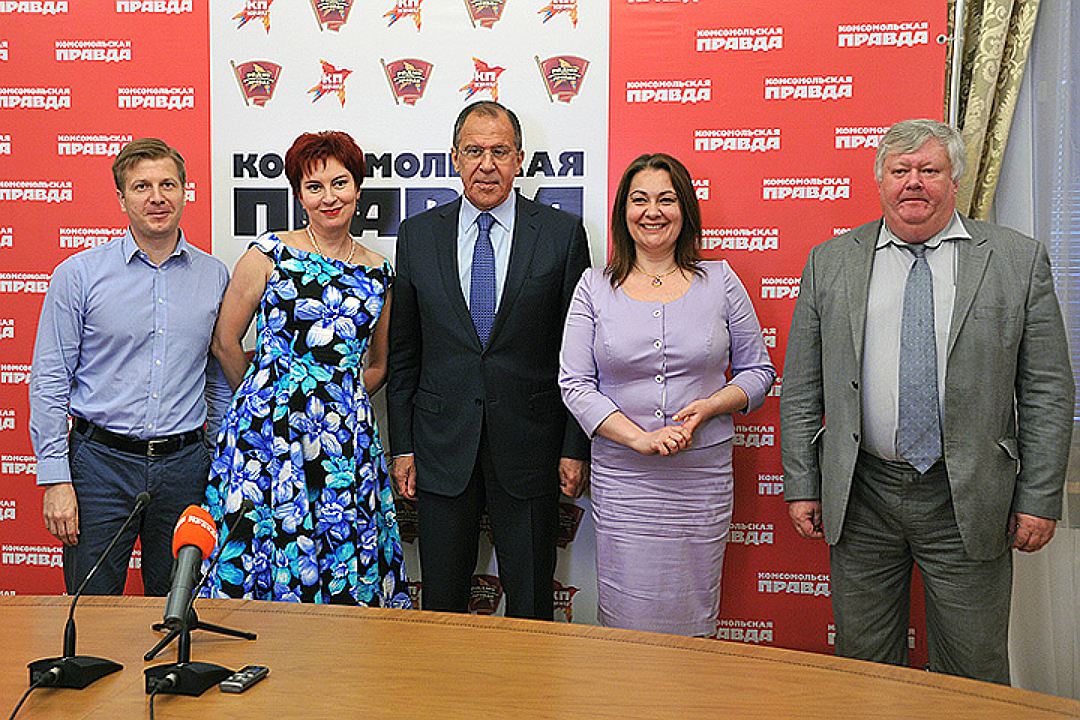
Lavrov and KP journalists after the press conference
From the beginning of the 20th Century, if we speak frankly, even from earlier times, even from the time of Ivan Grozni, no one wanted a strong and self-confident Russia. But it can be seen, during the last century, during the entire century, the British together with the Americans, did everything to prevent the integrity of a united Eurasia. This refers to the Russian Empire, the Soviet Union, and what is happening now regarding efforts for encouraging the integration process in the post-Soviet space.
All this fits in the concept of Zbigniew Brzezinski’s book, ‘The Grand Chessboard’, where he directly sets the task: do not allow the barbarians to unite. Of course, he uses figurative speech, but it is a clear indication of the direction of his thoughts.
Now we have a question – what to do. Demonization – yes, it is here. I do not see anything frightening in it. We have to get used to it. Our partners in the course of history, with a few exceptions, have never been honest with us. Remember Churchill’s speech at Fulton a few months after the end of the WW2, after the big joint victory of the alied forces.
During the war, Churchill, who publicly admired Stalin, and who praised the Soviet Union as a solid partner and ally, gave a speech which turned into a symbol of the beginning of the Cold War. I do not want to mention anything that some may use against me and accuse me of paranoia but… now, in connection with the events taking place in Hiroshima in the context of “the seven” (G7) and Obama’s visit, there were discussions in our country in the media and in the society about the reasons for the decision of the Americans to drop the bombs over Hiroshima and Nagazaki.
It is common knowledge that Truman seriously considered the same fate for 20 Soviet cities. I repeat that we have to be friends with everyone and in good relationship with everyone. This is our principle. The concept of foreign policy is multifacted and includes readiness for partnership, cooperation with everyone who is ready to cooperate on equal, mutually beneficial basis, taking into account the interests of others. But in promoting this line, we must remember very well who our main allies are – these are the army, the navy and the air-space forces.
Regarding the sanctions – Ukraine was only a reason for exacerbation of this sanctions campaign. Because the strategy to contain Russia began to show itself much earlier. As soon as they realized that since the year 2000, with the arrival of President Putin, that Russia wants to be above all, independent in its external affairs, in her internal affairs and her economic politics – as soon as they realized it, they started looking for ways to deter us.
Don’t forget that the “Magnitski law” was adopted long before the events in Ukraine. Now in relation to this law, numerous facts have come up and numerous documentaries (which are, by the way, forbidden in Europe) have proven that the death of Sergei Magnitski is a result of the huge affair of Brauder, who is an unscrupulous rogue, nevertheless the sanctions were implemented.
After this, Obama cancelled his visit to Moscow in the eve of the G20 Summit in St Peterburg in september 2013 because he felt insulted that Snowden, who ran away from the NSA, asked for asylum in our country. First, we were forced to accept him due to humanitarian reasons, and secondly, because his passport was revoked while flying. He had no document that would allow him to leave Russia. They again took offence, and began to frighten and threaten, although not as fierce as in connection with Ukraine.
This is what I am going to say: I have already spoken about it. We perceive the economic constraints that are applied against us as a window of oportunity; opportunities that must be used optimally in order to strengthen our food security, our technological security, the continuation of diversification in the economic sector and in international relations and finally, to create alternative effective financial mechanisms and systems for payments. I would say it this way: for us the question of when the anti-Russian sanctions will be lifted is irrelevant. We did not introduce them and we are not going to discuss any terms and conditions. For us, the key question is how to effectively use the present situation for the best interests of our economy and our developement.
Komsomolskaia Pravda: The next topic is Ukraine. The Minsk Process has been going on for more than a year. Many consider that the process is stalled and can not bring in positive results. Is there any hope that the Minsk Agreement will ever come to fruition?
Lavrov: I am positive that there is such hope. And it is not only hope. We must demand their implementation, which is something that we are doing. The Minsk Agreement is a result of very difficult negotiations on the highest level and then they were signed by Kiev, Donetsk, Lugansk, Russia, France and Germany.
This is the only document specifying the obligations of the countries in the conflict, with guarantees from the Eurpoean side and Russia. We should not allow this document to follow the fate of the agreement of 21 February 2014, when in the presence of witnesses from France, Germany and Poland an agreement was signed between Yanukovich, Yatsenuk, Klichko and Tiahnibok and the very next morning this agreement was trampled. At that time, our French, German and Polish colleagues were silent and embarassed.
And now if they allow those who performed the coup d’etat and are the major political force in the Ukrainian establishment to do the same with another document, this will make us lose face, including UN Security Council, which ratified the agreement without any changes, and in the form in which it was it was signed.
Again we are discussing the situation of the chicken and the egg – what has been there before, and what had to follow. Now, all of a sudden, the problem of security is the most important problem for President Poroshenko. And it is not only about cessation of fire, but ensuring the security by some international forces on the territory of Donbas. This was not anticipated in the Minsk Agreement. Donbas will never accept it. And according to the Minsk Agreement, all steps for regulations, without any exceptions, must be coordinated with Donbas.
In relation to security on the demarcation line, we strongly support the realistic increase in the role and responsibilities of the mission of the OSCE, as well as the increased number of observers. The Ukrainians say that the political reforms will begin only when there is a 100% guarantee for security, in the time frame of several weeks or months. This is unrealistic. This will never happen. This does not occur in any conflict until the political aspects of a crisis are resolved. And in relation to the political aspects, the ball is Kiev’s court. This applies primarily to the status of Donbas, which is included in the Minsk Agreement, and had to be dressed in a law for a special status and cemented permenantly in the Constitution of Ukraine.
The last step that must be taken within the frame of the special status cemented in the Constitution, are the elections. And all these questions – literally – must be coordinated with these regions – Donetsk and Luhansk regions, as they call them there. We do not see anything of this sort happening although efforts are being made continuously. It is in the frame of the contact group, that it is only place possible for a direct dialogue between Kiev, Donetsk and Luhansk; in the Normandy format, which cannot replace the contact group, despite how much Kiev and even Berlin and Paris may desire it; the frame of a contact group is the only place for a direct dialogue. When we were talking about the necessity of a direct dialogue between Donbas and Kiev, a German participant in the process was cynical and impudent to say, “why do you need a direct dialogue? You can press them in 15 minutes.” Literally.
Komsomolskaia Pravda: It’s better for them to press Kiev.
Lavrov: This is exactly what I wanted to say in conclusion to your question. But it seems to me that not only Germany and France and many others in Europe, but the United States as well, understand that Kiev simply does not fulfill the obligations undertaken by their President.
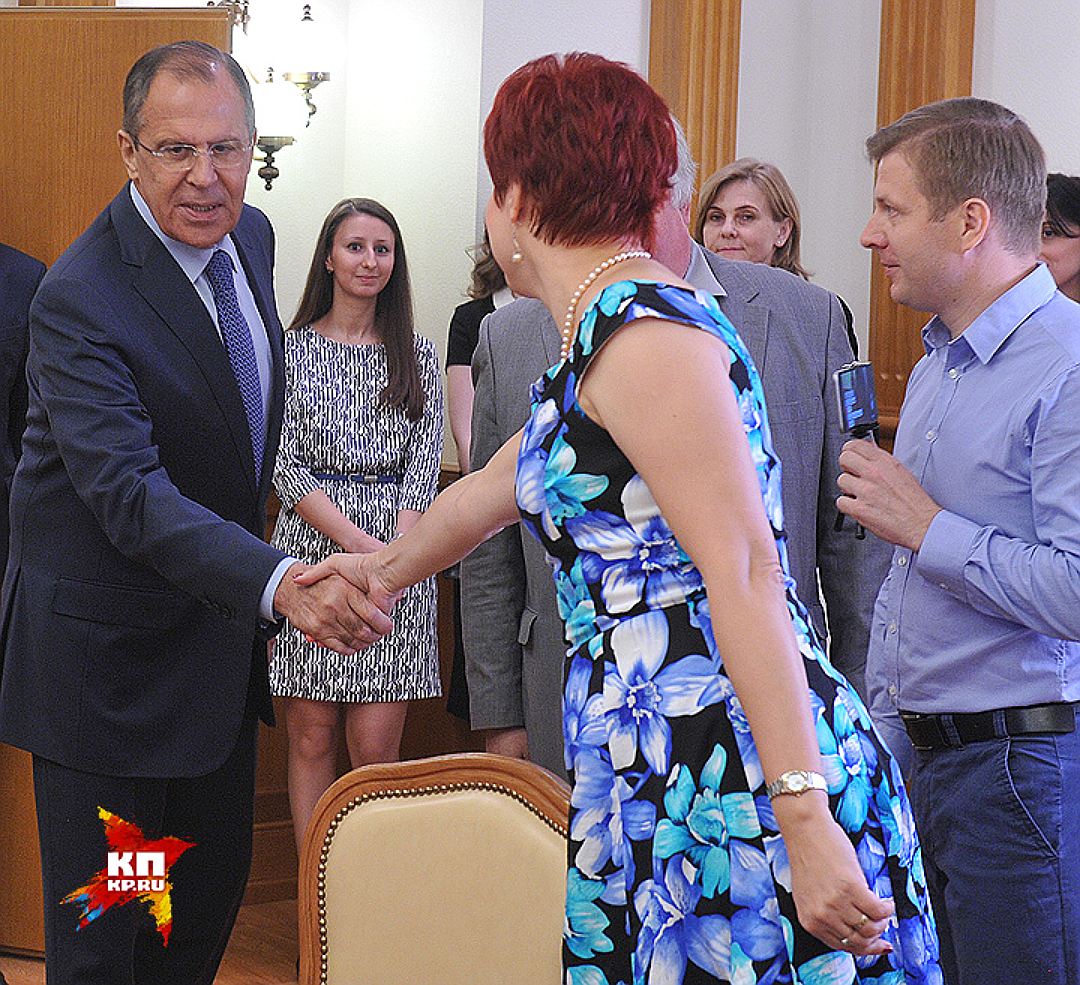
Sergei Lavrov and top journalist Daria Aslamova
Daria Aslamova: On the question of Donbas, I have been working there from the beginning of the events and I am a witness of the referendum, which took place there on the 11th of May. It is very difficult to explain, for example, why the referendum in the Crimea was recognised and why the referendum in the Donesk and Luhansk republics, which was also honest and sincere and took place in front of the journalists, was not recognised. There are questions from some of our readers, for example: “why Russia did not announce that in case Ukraine keeps on sabotaging the Minsk Agreements, Russia will have to be forced to officially recognise the DNP and LNP [Donesk People’s Republic and the Luhansk People’s Republic] by signing the relvant contracts as it has already taken place in Abhaziai and South Ossetia.” Or “why there was such a noticable decrease of Russia’s attention towards south-east Ukraine? Or the ruined Donbas is not the blooming Crimea.”
Lavrov: First of all, we have not abandoned the south-east parts of Ukraine. We have not forgotten it and it has our strong support. Not only politically. This is also humanitarian help and solving present economical problems. We will continue with our support. In the Minsk Agreement, it is written ‘the right of Donbas for free and unlimited economical and other relations with the Russian Federation’. This is one of the key components, which allowed us and the people of Donbas, to support the Minsk Agreement. As for the referndums: you know the conditions for the referendum in Crimea and the conditions for the referndums in the Donesk and Luhansk regions. According to the results of the referendums in Donbas, the leaders of these republics did not give up on dialogue with Kiev and as a result this dialogue took place as a whole, it is the very same package of the Minsk Agreements.
Daria Aslamova: They spoke about independence.
Lavrov: Once again, I will tell you that they never give up a dialogue with Kiev. Yes, they declared their independence, but they said that they are ready to talk. (…. Do you understand. We have a unique situation. No one can confront this document and no one can compare it to any other document. And if we say now: okay, we are running out of patience, we have chosen a different route, they will say “wonderful” and then the West will have no chance to influence the present Ukrainian authorities. (And now there is such pressure. the West is trying not to talk about it publicly, but when they communicate with the Ukrainians without witnesses, and we know this to be true, they strongly demand all that has been agreed upon in the Minsk Agreement). That’s why the international judicial framework must be protected from any attempt to be undermined from inside or outside.
Daria Aslamova: What about the Maidan? I have been working in Ukraine for eight years and I experienced the Maidan, I witnessed the events. i think that this is a failure of our diplomacy because in April 2013, Komsomolskaia Pravda wrote that there are preparations for war. That there is a readiness for war against Russian people. The preparations for the war were taking place in Galitsia. They were not hiding their plans. We wrote about it and no one paid attention. All the pro-Russian politcal analysts working at that time in Ukraine, declared that they can neither influence our ambassador, Zourabov, nor meet with him. The meetings were taking place once annually on the 12th of June, the holiday of vodka, as they say. Absolutely no influence. In other words, we were not prepared for the Maidan conditions and we lost it in that situation. The people have a reasonable question: why is Zourabov still working in Ukraine?
Lavrov: It is probably better to leave this topic out of public discussion.
Daria Aslamova: Why? This is our foreign diplomacy.
Lavrov: Ambassador Zourabov may report and will report to the Ministry of Foreign Affairs as well as the Parliament. I would like to understand the meaning of your questions.
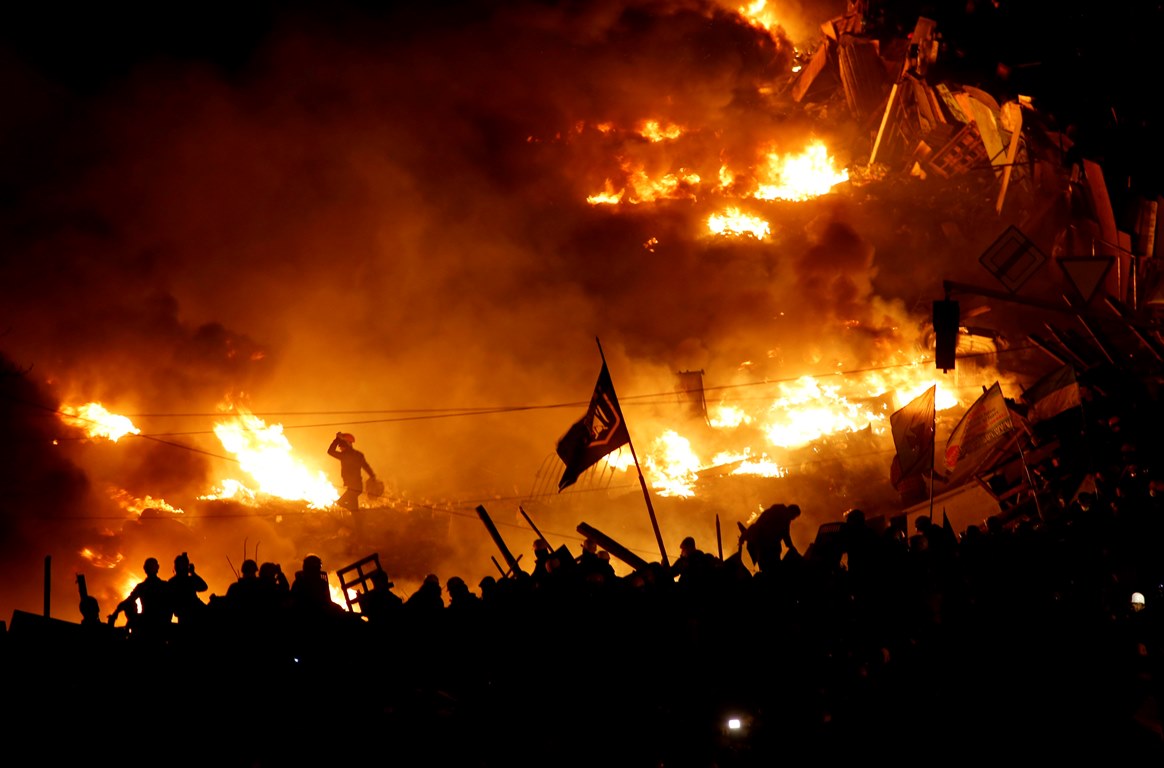
Anti-government protesters stand behind burning barricades in Kiev’s Independence Square February 19, 2014. REUTERS/Vasily Fedosenko
Daria Aslamova: The question is that we were not ready for Maidan.
Lavrov: This is what I’m talking about. You say that we have lost the Maidan. If you are so sure in it, if there are many people who are talking to you about it being lost because our diplomacy did not work, what alternatives are suggested that we should have taken in case the people are so convinced that this is a failure.
Daria Aslamova: Look at what the American embassy was doing. It did not save money for propaganda against us. They were paying thousands of dollars to the websites. These are pennies for such a big country like ours. They inundated us with curses for 10 years. They did not hide that they spent five billion dollars for propaganda against Russia, ostensibly to promote freedom of speech. Our embasies are demonstrating a lack of initiative. The voice of the American ambassador has always been heard, but the voice of the Russian ambassador has not been heard, with a few exceptions. For example, I can give you Lebanon. There, ambassador Zasipkin, did a wonderful job. After him, the situation in Lebanon changed dramatically as the people constantly listened to his interviews. Our ambassadors and embassies are bunkers, which are morally and in any other possible way, closed into their little world and they don’t go out of there. Another example, Croatia. Now the Ukrainian ambassador who we may say raped the local media, has got a column in the newspaper where he weekly pours dirt over Russia. You cannot hear the voice of our people. Where are they? Why are they hiding? Why don’t they go to the media? Why don’t they give interviews? This is my big problem. I work in so many countries and everywhere I am told about the evenings dedicated to Pushkin or Tchaikovsky. Who is interested in this now?
Lavrov: I can not agree with this. Because we have such ambassadors in USA, United Nations, Lebanon, Iraq, Syria, and our representatives in Geneva. These are people who are not popular just because they regularly appear on the TV screens. These are people who are doing a collossal work. You must understand one thing. To appear on the front page of a newspaper in the columns, on TV, on the radio, this is far from being the complete work and in most cases, this is not the most important part of the work. You are talking about some payments to different sites. In Kiev, there was not only payment from the side of the American embassy, there simply an entire floor of the headquarters of the security services has been occupied by the agents of FBI, CIA and NSA.
Daria Aslamova: And it is still occupied by them.
Lavrov: Yes it is. And here, once again, I would like to ask, what was the alternative? Did we have to pay the political analysts to make websites as well?
Daria Aslamova: Even if you don’t pay, at least to help a bit.
Lavrov: When the bandits got out at Maidan, we insisted that they play by the rules of the Constitution of Ukraine. They did not want to do it and after all, these opponents negotiated with Yanukovich for the agreement signed on the 21st of February and which, in reality, supposed that Yanukovich gave up his presidenial powers to use force. It was a refusal of monopoly over the use force and an agreement for early elections. In other words, if this agreement has been fulfilled, now Yanukovich would have taken the democratic route. Of course he would not have been elected.
The very same people would have been in power, but there wouldn’t have been so many victims and destruction. What would you suggest? Should we have brought in the army when these bandits started the riots?
Daria Aslamova: Excuse me, but we held all the cards in our hands. The legitimate president of the country was running to us, there was a millitary coup in a country that is close to ours and friendly. The President requested help from us. We had all the rights to help improve the situation.
Lavrov: To get involved in a fight.
Daria Aslamova: A handful of thugs took power. This is a military coup.
Lavrov: Yes, that’s right.
Daria Aslamova: Why didn’t we do it? I will tell you why. Because we are constantly sticking to the theory of a sovereign country, which is tying our hands and feet. The Americans have wonderfully developed the theory for humanitarian intervention. The obligation to interfere and so on. All the time that we are talking, sovereign country, and we got ourselves entangled in this. I am not promoting ideology. We also have the moral right to interfere.
Lavrov: Let’s skip the terminology. Answer my question directly.
Daria Aslamova: We had to send in troops.
Lavrov: You think that we had to send in the army?
Daria Aslamova: It was our obligation to get involved as a humanitarian intervention.
Lavrov: I disagree. A fight between Russians and Ukrainians…
Daria Aslamova: This is not a war.
Lavrov: This war was started by those who came to power by military coup. It was a war against their own people. I think that the Russians and Ukrainians are the same people. And if you think that our position must be inclusive of the unleashing of a war against our own people, I am categorically against it.
Daria Aslamova: I am not talking about unleashing a war but sorting out a gang which took the power.
Lavrov: Now behind this gang there is an enormous quantity of people in service and not necessarily in service in the same national divisions.
Daria Aslamova: This is a junta.
Lavrov: You can call them whatever you want but they are tens of thousands. So you suggest that we should sort out tens of thousands of Ukrainian citizens.
Daria Aslamova: They became tens of thousands after we left and we left them to self-control.
Lavrov: The army swore loyalty to the new government and the new government should order this army to face the Russian army? This is some kind of horror. I can’t even imagine it.
Daria Aslamova: We had three weeks…
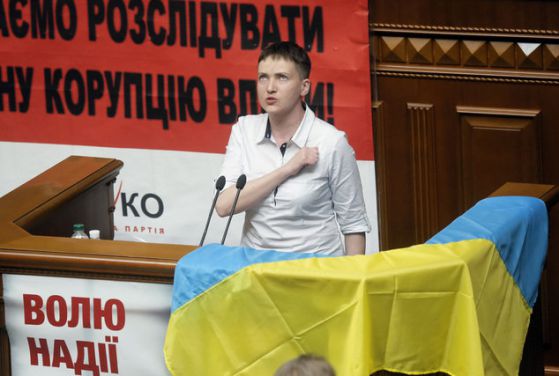
Caption: Nadejda Savchenko sworn in as a deputy on 31st of May.
Komsomolskaia Pravda: The news last week that distrubed many of our readers and listeners was the notorious Savchenko. They are asking you, Mr Lavrov: “what is your point of view regarding the pardoning of the criminal, Savchenko, who killed our journalists? She will now arrange provocations against Russia at every opportunity.” Did we act correctly here or not?
Lavrov: I think we acted correctly. We had to get our citizens back. This is what happened. Principally, we support this not only in such situations but within the frame of the Minsk Agreement to exchange everyone for everyone. But do you know that if Savchenko plays dirty now, tell me one who doesn’t play dirty in Ukraine? There they have almost no politicians who can communicate normally with us. I think that it will give headaches to Ukraine. The young lady is quite a character, by the way, quite rounded. That’s why all this hysteria around her hunger strike, I think, will make it clear what it really means. Let them sort themselves out. Now she wants to become a president, she wants to fight against us and what not…
Komsomolskaia Pravda: Our readers are asking a rhetorical question, will Mr Kerry be able to answer the question of our President: “do you realise what you have done?”
Lavrov: You know, I have spoken to him many times on the very same topic, when we have discussed Syria. It is very pleasant to communicate with him. Since January, we have spoken on the phone more than 30 times, and we have had four personal meetings and this is certainly not our last meeting or telephone conversation. But when we have this opportunity, we are talking about Syria; I would like to remind you, by the way, that in 2012 together with Hillary Clinton, the Europeans, the Chinese, the Arabs and Turks adopted the Geneva Communique, which states that the transitional political process which will create some common structure of the government and the opposition must start on the basis of mutual agreement. when everything was approved, Russia presented the document to the UN Security Council and we said let’s get this approved in a resolution of the Security Council. The Americans said no because this agreement doesn’t say that Assad must go and if he doesn’t, there would be sanctions against him. I told them where can you see it written. In Geneva, we were sitting together and discussing it for seven hours. They categorically refused. This principle of mutual agreement, the principle of direct dialogue; they ran away from this. Like in Dombas. But in Dombas, the authority runs away from the dialogue and in Syria, the opposition. Such are our Western colleagues. And when we discuss these matters with Kerry, I say “John, okay, why are you hurting yourself again?” He told me. In 2003, Iraq, I was a Senator and I voted against. I told him “excellent”. Obama was also against. Wonderful. What about Libya? – Yes, Iraq was a mistake. Libya was with Hillary. It was also a mistake. But the mistake was not in breaking the mandate of the Security Council, which provides only closing of airspace and prohibition of flights. They bombarded from that sky and after all, they brutally killed Gaddafi. This is a military crime. He (Kerry) says it was also a mistake. I told him, look at Libya now. It’s full of terrorists. A flow of fighters and arms goes through Libya, up to Mali, Chad and central Africa. He told me: the mistake was that after the bombardment, we did not bring in troops and consolidate the situation. We did not crush the terrorists. I told him: you already brought your troops in Afghanistan to fight terrorism and in Iraq to fight the very same terrorism. After that, you successfully left, leaving the former and the latter, as with Zhvanetski: he understood her situation and left her in a situation. However, much worse situations were left in Iraq and Afghanistan. On the edge of collaps on one side, and on the other side, the civil war is still on.
They say that this was a mistake but it’s in the past. This is their logic. So let’s get busy with what we want now. But we also want to get busy in Syria. However, the method must be worked out by learning at least a little bit from the lessons learned from past experience.




U.S. Exceptionalism. We shouldn’t be allowed to handle sharp knives, let alone govern the affairs of other nations.
It’s yet to be explained how it went from the actions of thousands of street bandits to the jouning of the high command of the armed forces.
Who made the coup: a handful of murderers trained for two years in Poland or the Army, using first those bandits?
Good point Alberto, it begs to ask why is Russian answer in Ukraine so different from the one in Gruzia? Is it because they foresaw that leaving the vast majority of Ukraine to the enemy (like in Gruzia) would not be acceptable from the defensive/security point of view? and this may be the reason why UA is not attacking Donbas with full force…
Hello Alberto. Good morning to you.
I offer this only as my opinion, in response to your post. I think long before the coup took place, it was decided that the West really needed a hard lesson. As Lavrov stated, they had been observing all that had been taking place in Ukraine,… and in Libya, Syria, Iraq and all the rest. Russia concluded that the US and the rest of the possie needed to lose a finger, in order to begin to think about the consequences of the systemic coups taking place around the world. To have intervened directly, would never have driven home this lesson. Plain and simple, the occidentals have themselves caught in a Bear trap and there is no other way out of it, except to cooperate and change the way of doing business.
Sometimes, although gruesome and very difficult, when one refuses to stop playing with the lawnmover while it is running, they will be, eventally, bitten by it. Fare thee well Alberto.
If one say:”there will be no world war…” doesn’t that mean that ultimately one will capitulate? Isn’t this the Bay of pigs all over again? It appears that Sergei has been muzzled of recent, and all this talk about “partners” just intensified? And perhaps this is a partnership, albeit a contradiction itself, towards the same goal? Goal so dark in nature that it needed to be brought by stealth…
Outstanding. My view of Lavrov is that he is one of the few adults on the diplomatic scene, that I am aware of at this time. If I am taking anything away from this interview, it would be taht the West needs to spot spinning it’s wheel in the mud of a world that does not really exist; aka: the west is in deep space witht regards to where Russia is at and where it is headed.
.
There’s no mistakes in US foreign policy. Just cold calculating murder and a few lying jackasses who will tell Lavrov what a terrible mistake it all was…
Fortunately for all of us it is not occupied by FSB